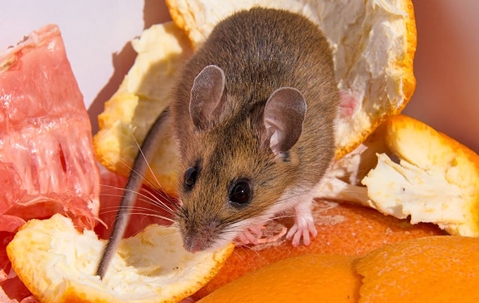Mice infest over 21 million American homes each year, contaminating food, spreading deadly diseases, and leaving gnaw marks all over the house. Mice chewing on electrical wires is the second most common cause of house fires in the country.
As a Connecticut homeowner, you're likely to run into either a common house mouse or its cousin, the deer mouse, on your property.
The house mouse is a small rodent, 2 1/2 to 3 3/4 inches in length, with a round body, big ears, and a pointed muzzle. They're usually dusty grey with cream-colored undersides. House mice are the most common rodents to invade homes and are known to breed rapidly and form large colonies.
Deer mice are a bit larger, 5 to 8 inches long, with light brown fur and white undersides and feet, similar to a deer. They're easily distinguished from house mice by their bi-colored tail. Deer mice are usually not huge fans of people or their homes and prefer to stay in rural, outdoor areas but will try to overwinter in sheds and other outbuildings during severe cold snaps.
Let's talk about signs of mouse infestation to watch for, the dangers of having mice in your house, options for DIY mouse control, and, if DIY doesn't do the trick, how to find quality pest control in Norwalk.
Clear Signs Of Mice In Your House
Mouse infestations often go unnoticed for a long time since mice are nocturnal and great at staying out of sight. Watching for the following signs of mice in your Norwalk home will help you identify the problem sooner:
- Gnaw marks on the wall, furniture, and books
- Mouse droppings, usually 1/8 to 1/4 inches long and rod-shaped
- Oily rub marks
- Mouth prints, 4-toed from the front and 5-toed from the hind feet.
- Mouse urine odors
- Damaged packages of seeds and cereal
Spotting a live mouse darting across the floor is usually a reliable sign that the infestation is in advanced stages, with rodents having to range further out in search of food and nest-building materials.
It's Very Dangerous To Have Mice In Your Home
Besides contaminating food and surfaces traveled with numerous bacteria and pathogens, mice carry and can transmit a number of sicknesses:
- Hantavirus
- Leptospirosis
- Tularemia
- Salmonellosis
- Adult respiratory distress syndrome (ARDS)
Mouse feces and saliva can also trigger asthma attacks and severe allergic reactions.
Why Mouse Traps Aren't Enough To Get Rid Of An Infestation
Mouse traps are the most common and affordable DIY approach to controlling mouse infestations. The problem with utilizing them is that while mice can't see all that well, they have a very well-developed sense of smell. They can tell when a human has handled a trap, and mice will avoid them regardless of the tempting treat used as a lure.
Also, mouse traps only work on unaware rodents. If there is more than one mouse in your house, there is a good chance the first mouse getting trapped will serve as a lesson in avoidance for the rest of the rodents in the home.
The Most Effective Way To Get Rid Of Mice In Your Home
It takes proper tools and experience to effectively deal with a mouse problem and avoid a reinfestation. At Insecta X Total Pest Solutions, we have been helping Norwalk residents deal with mice and other Norwalk pests for over 33 years, offering a re-treatment guarantee and pet-safe treatment options.
If you've spotted signs of a mouse infestation and can't get a wink of sleep thanks to the little invaders, give us a call to schedule an inspection and to learn more about our residential and commercial pest control services in Norwalk.

